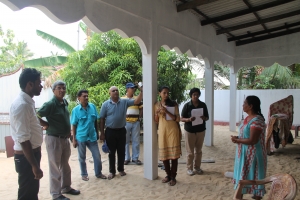Mary Matline Smiles Again!
Location: Manalkadu, Sri Lanka. 19th Sep 2017
While hundreds and thousands struggled to recover from the tsunami disaster, it was only after the war ended in 2009 that communities could really reorganise their lives and regain a sense of normality.
Mary Matline, a mother of three, was one of the survivors. During the war, she was displaced from her village and had to take refuge in Vavuniya town with her family. During a cease-fire, she travelled to Manalkadu, a coastal village situated in resource rich Jaffna district, where she lives today.
The majority of Manalkadu residents are involved in fisheries, crop cultivation and livestock farming. Due to water shortages and limited household income, these livelihood activities cannot be carried out on a large scale. Unregulated and uncontrolled activities such as sand mining, cutting of casuarina and mangrove forests, and illegal fishing are also symptoms of insufficient and unstable income generation options.
Through an MFF funded project, local NGO Aruthal Sri Lanka introduced alternate livelihood options to 71 selected families, targeting the most disadvantaged families with irregular incomes.

Mary (second from the left) sitting with other community members at a session that aims to raise awareness about climate change
In 2015, Mary’s husband, the main breadwinner of the family, fell ill after an accident and could no longer work.To contribute to the household income, Mary prepared food for fishermen in the area. Initially, Mary sold madevadai and vaipan (types of banana bread), but the income this generated was not enough to cover household needs. Even though Mary was determined to expand her business, she had no one to support her. This changed when she was selected to participate in the project.
With the assistance of MFF, Mary was able to prepare meals for villagers at a larger scale. At first, Mary’s husband and son were not supportive of her new business, but she was able to convince her family about the benefits of having a steady source of income. Today, Mary’s husband is actively engaged in helping her prepare the food, clean, and do other domestic chores at home. Depending on the amount of orders, they prepare and sell their food at different times of the day.
Mary is now the owner of a successful and thriving business. "I am so lucky. MFF gave me this opportunity, so I will not give up this business at any cost," said Mary proudly.

Mary being interviewed by the MFF MLE team
With a regular income of over US $100 per month, which is US $60 more than what she used to make before the project, and with the support of her family, Mary can now afford medicines for her husband and tutoring for her youngest child.
With money saved from the business and land received from the government housing scheme to build a new house, Mary and her family feel empowered to expand and sustain the business into the future. She says, “My husband and I are not depending on anyone, this business makes us hopeful about our futures.”
This story was contributed by Damith Chandrasekara, National Coordinator for Sri Lanka. Damith drafted the piece following the IUCN Asia Strategic Communications for Conservation Workshop in Bangkok, Thailand, which took place in July.

Mary being interviewed by the MFF MLE team © MFF